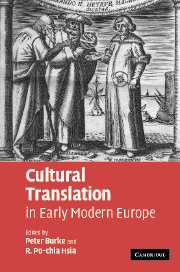Book contents
- Frontmatter
- Contents
- Notes on contributors
- Introduction
- PART I TRANSLATION AND LANGUAGE
- PART II TRANSLATION AND CULTURE
- 5 Early modern Catholic piety in translation
- 6 The translation of political theory in early modern Europe
- 7 Translating histories
- 8 The Spectator, or the metamorphoses of the periodical: a study in cultural translation
- PART III TRANSLATION AND SCIENCE
- Bibliography
- Index
6 - The translation of political theory in early modern Europe
Published online by Cambridge University Press: 27 July 2009
- Frontmatter
- Contents
- Notes on contributors
- Introduction
- PART I TRANSLATION AND LANGUAGE
- PART II TRANSLATION AND CULTURE
- 5 Early modern Catholic piety in translation
- 6 The translation of political theory in early modern Europe
- 7 Translating histories
- 8 The Spectator, or the metamorphoses of the periodical: a study in cultural translation
- PART III TRANSLATION AND SCIENCE
- Bibliography
- Index
Summary
INTRODUCTION
The huge range of political ideas that circulated in early modern Europe can often seem bewildering, and bringing order and unity to this picture of diversity can be difficult. There were ideologies of monarchy, coming from both a Christian tradition and a Roman imperial one; theories of resistance against tyranny; republican political ideas from the Italian city states and the Netherlands; constitutional theories; approaches to politics stemming from epistemological or moral scepticism; political ideas based around the idea of the state; theories of natural law; and scientific approaches to political organization and moral truth. It is extremely difficult to say something intelligible about such a complex array of political ideas, despite their importance for understanding the early modern political world.
Methodologically, the study of such a range of political ideas presents a number of challenges. One recent approach has been to look at the texts concerned not just in terms of their contents and their logic, but also in terms of the context of their creation. This can be thought of either in terms of a particular political situation, or an intellectual tradition or, more fruitfully, as a combination of both. Such an approach would give us a deeper understanding of the nature and the life of these political ideas.
In so doing, it is possible to come to a closer understanding of what a particular text is designed to do, and how it relates to the political culture in question.
- Type
- Chapter
- Information
- Cultural Translation in Early Modern Europe , pp. 101 - 124Publisher: Cambridge University PressPrint publication year: 2007
- 4
- Cited by



